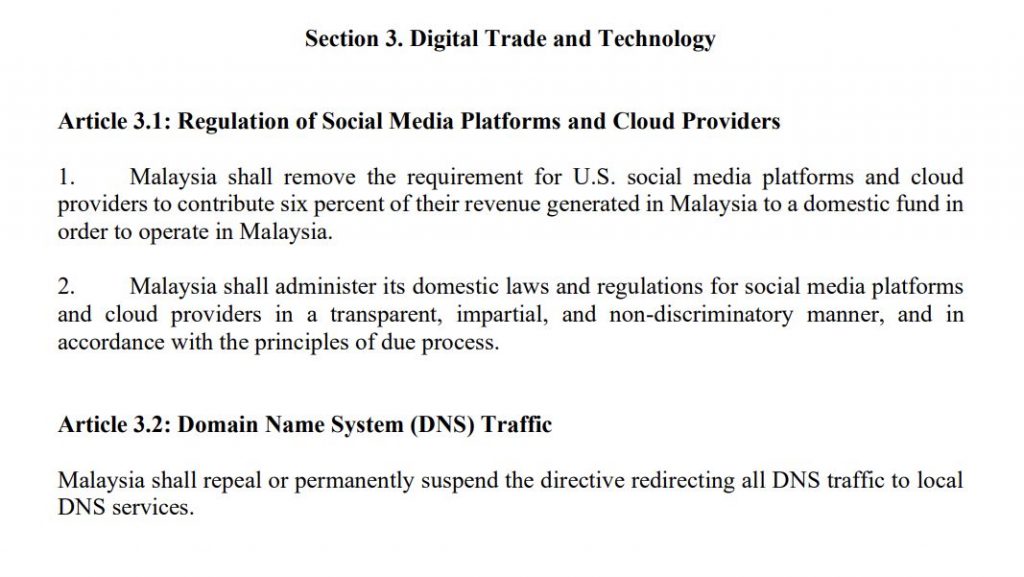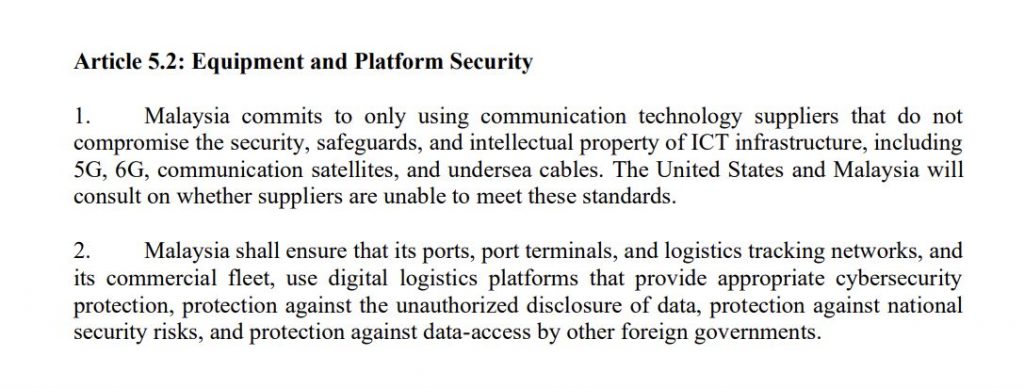Last weekend, Malaysia and the United States (US) have signed a trade agreement which covers several aspects in the digital and technology space.
Among the key provisions is Malaysia’s agreement not to impose a digital service tax on US tech companies and to scrap the mandatory 6% contribution to a domestic fund previously required to operate in the country.
When it comes to ICT infrastructure, including 5G and 6G, Malaysia also commits to using only technology suppliers that meet agreed security standards, in mutual consultation with the United States.
Digital service tax exemption for US tech firms

Under the agreement, Malaysia shall not impose any form of digital services taxes, or similar taxes that discriminate against US tech companies. This is seen as a move to protect US-based digital service providers ranging from social media to streaming and cloud computing platforms.
Malaysia has imposed a 6% digital tax on online services since 1st January 2020 and they have collected over RM400 million in the first year. The digital tax is applicable on various online platforms such as Google, Netflix, Adobe, PlayStation Store, Steam, Facebook and AWS.
With this agreement, Malaysians may soon be able to subscribe and access these US-based digital services without the digital tax.
Waiver of 6% Universal Service Provision (USP) contribution for US tech giants

Besides digital tax, Malaysia has agreed to exempt US social media and cloud service providers from contributing to a domestic fund in order to operate in Malaysia. The clause effectively exempts major US tech platforms from contributing to MCMC’s Universal Service Provision (USP) fund, which supports telecommunications and rural connectivity initiatives such as deploying new towers and fibre in underserved areas.
Currently, all social media and cloud service providers, both domestic and international operating in Malaysia, are required to contribute 6% of their revenue to the fund like any other telco as part of their licence requirement from the MCMC.
Transparent and impartial regulation for social media and cloud partners
The agreement also states that Malaysia shall administer its domestic laws and regulations for social media platforms and cloud providers in a transparent, impartial, and non-discriminatory manner, and in accordance with the principles of due process.
This seems to indicate that any regulatory enforcement by the MCMC on US-based platforms, which may include content moderation or data disclosure, must be conducted according to clear procedures, in a transparent and fair manner, and without discrimination.
Permanent suspension of DNS redirection to local DNS servers
Interestingly, the agreement also touches on the controversial DNS redirection that was conducted quietly by the MCMC in 2024. As part of the agreement, Malaysia shall repeal or permanently suspend the directive of redirecting all DNS traffic to local DNS service.
As reported back in August 2024, telcos had been instructed by the MCMC to enhance their “DNS management” to protect citizens from online harm. At the time, internet traffic that goes through alternative DNS such as Google and Cloudflare were forced back to local DNS. After public backlash, Communications Minister Fahmi Fadzil announced a U Turn on the directive.
Trusted technology clauses for 5G, 6G, satellites and undersea cables

A key addition in the agreement is Malaysia’s pledge to only use communications technology suppliers that do not compromise the “security, safeguards, or intellectual property” of ICT infrastructure. This covers major critical connectivity from 5G and 6G networks, satellite communications and undersea cables.
It is also stated that both Malaysia and US governments will consult to determine whether specific suppliers fail to meet these standards. On the surface, this seems to imply that Malaysia is aligning towards US-backed and trusted technology partners.
Malaysia must consult US on digital trade, no restrictions on rare earth exports

Malaysia is also required to consult with the United States before entering into a new digital trade agreement with another country that jeopardises US interest.
Separately, Malaysia is also required to refrain from banning critical mineral exports to the US and shall remove any rare earth export quota to the US. Malaysia also commits to the expedient development of its rare earth and critical minerals in partnership with US companies to ensure secure and diversified supply chains.
Malaysia also must provide greater certainty for companies involved in critical mineral extraction, including granting extended operating licenses with a focus on enhancing their technical capabilities, creating certainty for businesses to increase production and supporting operational growth.
Malaysia also agrees to encourage supply of rare earth magnets on favourable terms to the US, subject to mutually agreed arrangements. Malaysia shall also not impose restrictions on the sale of rare earth magnets to US companies.
What are the long-term implications for Malaysia’s digital and tech policy?
The trade agreement signed by Prime Minister Datuk Seri Anwar Ibrahim and US President Donald Trump offers Malaysia better access to the US market. While the US reciprocal tariffs on Malaysia is still maintained at 19%, 1,711 items have been exempted which include key export commodities such as palm oil, rubber, cocoa, aircraft components and pharmaceuticals.
Although Malaysia’s exemptions and security clauses in the tech sector will largely benefit US technology giants, questions remain over their long-term implications for domestic players and other global tech ecosystems.
Will Malaysia extend the 6% digital-tax exemption and 6% USP-fund contribution waiver to Malaysia-based platforms and cloud-service providers? If not, this could create an uneven playing field where US tech companies enjoy preferential advantages over home-grown innovators.
The technology clauses governing critical ICT infrastructure and digital trade also raise concerns about Malaysia’s freedom of technology choice. At present, U Mobile is partnering with Huawei and ZTE for its second 5G network rollout. Several years ago, the United States warned Malaysia about potential national security risks arising from Huawei’s involvement in the country’s 5G rollout.
Will Malaysia’s technology options in future be limited to suppliers deemed favourable to the West? How do we ensure digital sovereignty and fair competition?
[ SOURCE, IMAGE SOURCE ]
0 comments :
Post a Comment